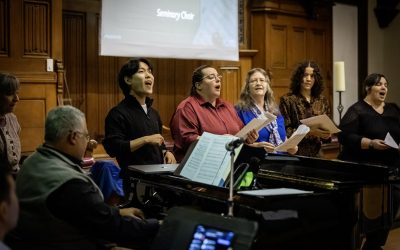The professors continue their research and advocacy for global women’s rights and refugee crises
November 2022 – Drew University’s Caitlin Killian, professor of sociology, and Jennifer Olmsted, professor of economics and director of Middle East studies, joined us for our new Focus on Faculty series, where we highlight the many accomplishments, research, and scholarship of Drew’s incredible faculty members.
Enlarge

Killian and Olmsted often work together to combine their advocacy efforts and research strengths in the areas of global women’s rights and refugee crises.
The professors were recently invited to the meeting of the International Association for the Study of Forced Migration, where they presented “Syrian Women Refugees and the Constraints of Patriarchy, Nationalism, and Capitalism.”
We spoke with the duo about their timely research, current projects, and how students can get involved.
Talk to us about your advocacy for women’s rights globally.
Professor Killian has researched infringements on Muslim women’s right to wear a headscarf in France and other European countries and has written academic articles and for a broader audience on this issue. Professor Olmsted has researched a number of refugee crises during her career and also worked for two years as the gender advisor for the United Nations Population Fund (UNFPA).
In 2019, we did a project for the United Nations Development Programme (UNDP) on the Syria crisis and refugee women’s livelihood initiatives in Jordan, Lebanon, and Turkey. We also have a paper forthcoming on sexual and reproductive health and justice in post-conflict settings in Review of Radical Political Economics.
Why is this work so important, especially now in the Middle East?
The Syria crisis has lasted for a decade, but it is not the only crisis. The Palestinian crisis is ongoing with refugees living in neighboring countries for decades. More generally, the Middle East is hosting more refugees, both in raw numbers and on a per capita basis, than any other region of the world.
Enlarge

One of the biggest problems is that refugees are often not allowed to work legally in their host countries or are restricted to certain occupations. Women are a big part of the economy, but their needs are often ignored. Women have care responsibilities that must be taken into account as we shape training and job initiatives. There needs to be a mix of jobs that are traditionally seen as jobs for women, such as hairdressing, and training for less traditional work in construction, for example. And childcare is a must.
Governments should be pushed to subsidize childcare provision, and in countries facing financial challenges, outside development assistance (foreign aid) should help support it. In addition to recommending policies to better integrate women into local labor markets, we also advocate for more lenient asylum policies, with a particular emphasis on the high-income countries.
Our most recent journal article argues that in post-conflict contexts, sexual and reproductive health and justice needs to be a bigger priority. Not only is this a gender rights issue, but it is a long-term sustainability concern as well because when women’s reproductive rights are not a priority, there are macroeconomic implications. We also point out that reproductive rights are under attack in many places in the world, including in the U.S. The two biggest arms exporters, the U.S. and Russia, are also two countries that have played a critical role globally in undermining reproductive health and justice, in the case of the U.S., the latter under Republican administrations.
Do you explore these topics with your students in the classroom?
We regularly teach about these issues in Professor Killian’s Sociology of Gender and Sociology of Reproduction classes and Professor Olmsted’s Global Economy and Gender and Globalization classes.
How can students get involved?
Drew has a long history of working with refugee groups. Students can reach out to the Center for Civic Engagement or the Center on Religion, Culture, and Conflict to find out more. Drew also has a number of active student clubs, including Feminist Intersection and the Sexuality and Gender Alliance (SAGA) that address issues related to sexual and reproductive health and justice.


